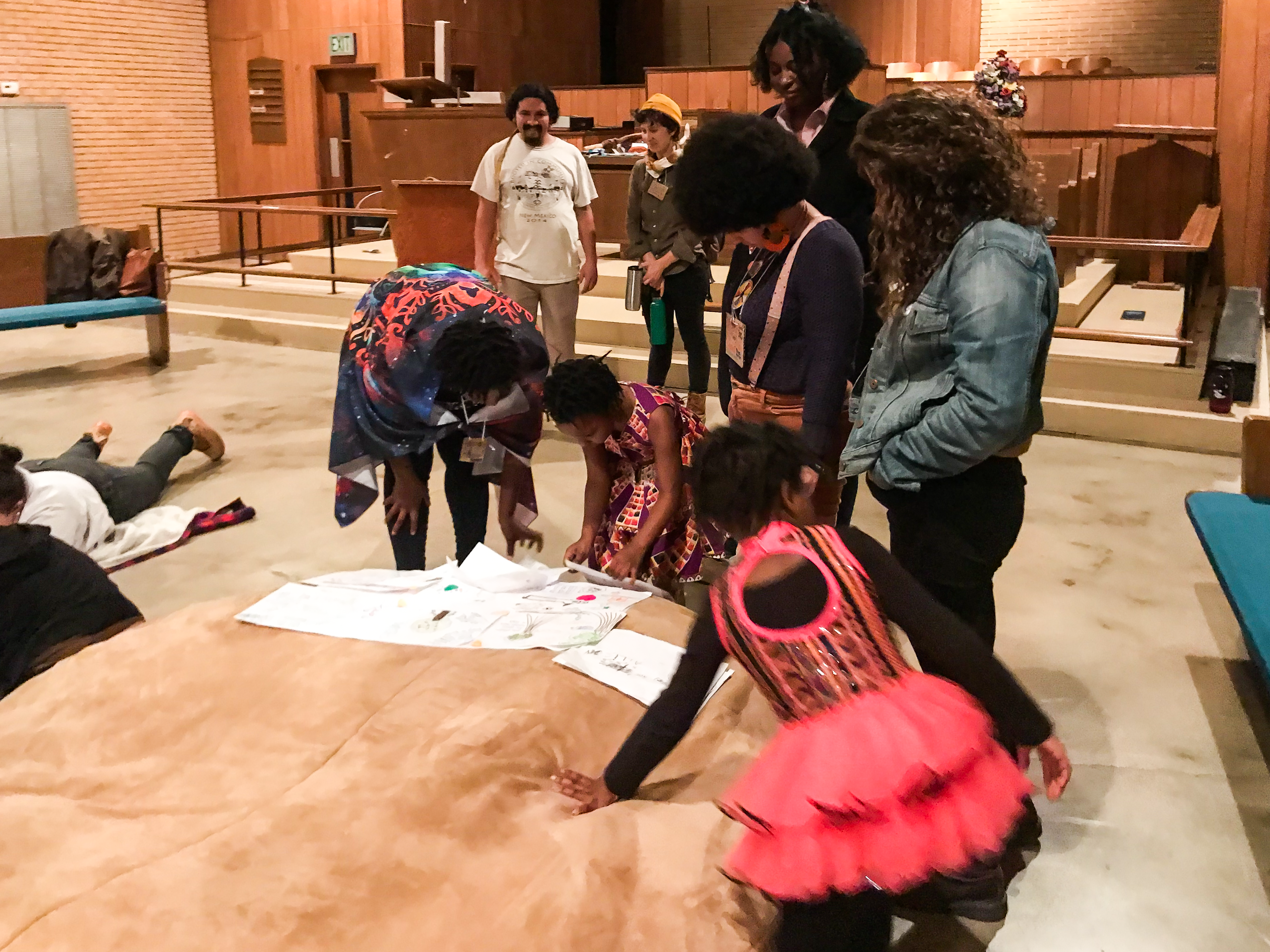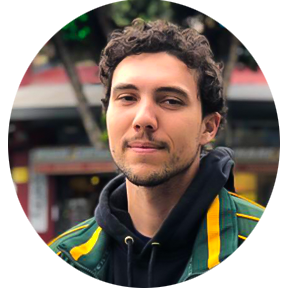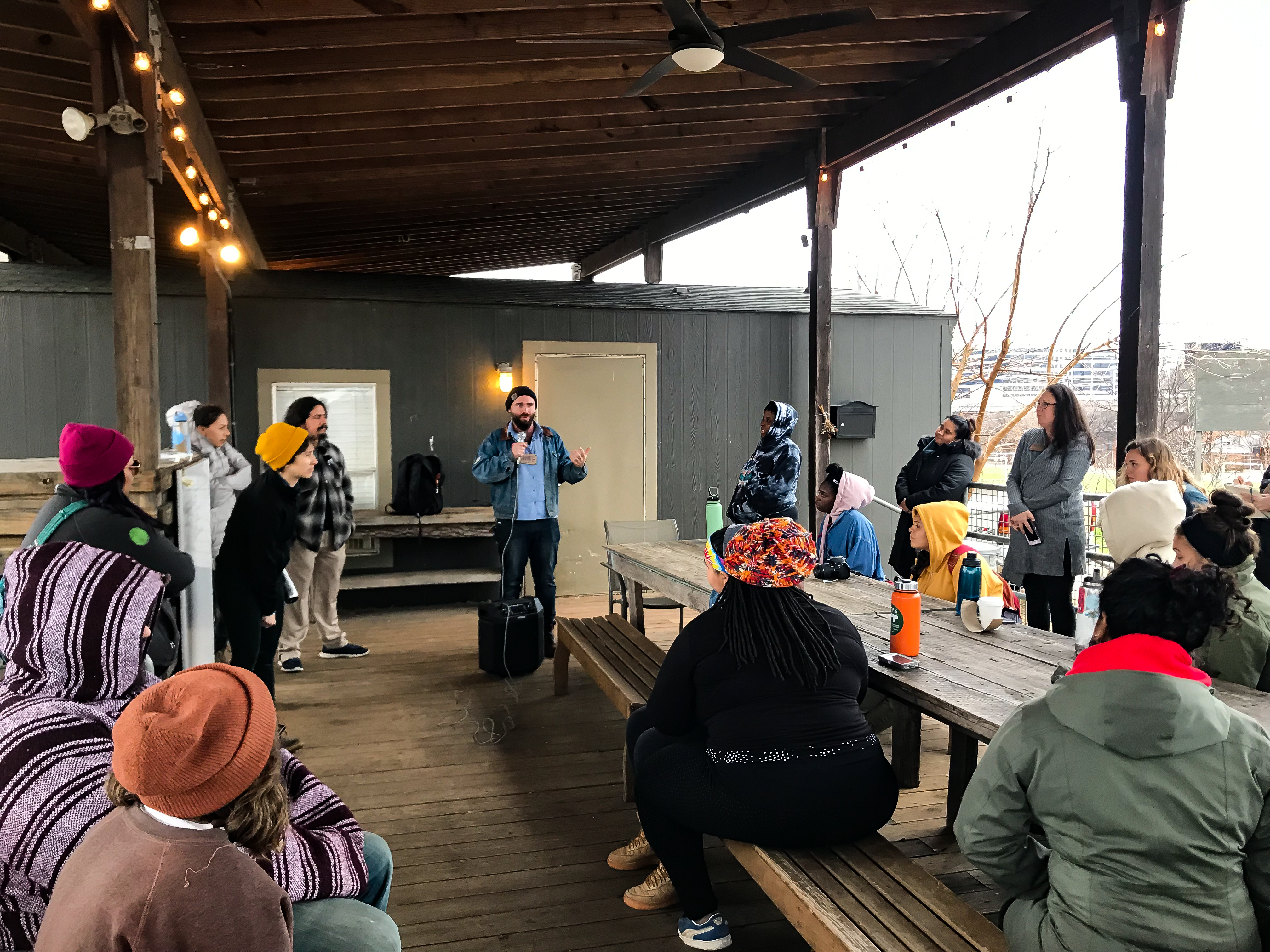by Marcel Ramos, Youth Development Program Coordinator
This past December, I had the opportunity to attend Rooted in Community’s biannual Winter Leadership Institute. I traveled to Birmingham, AL, gathering with young adults from organizations across the country to discuss the importance of youth roles in the food justice movement. Over the course of three days, we participated in an assembly of engaging activities to shed light on the challenges of the food justice movement, with the intention of developing solutions to strengthen our respective youth programs.
(Photo: Travís from Rooted in Community, welcoming us to the space in Birmingham, Alabama.)
Travelling to Alabama to discuss food justice was a transformative experience that helped shape my perspective on the work we do at the Ecology Center. Birmingham’s local history of social justice movements provided a unique and empowering context for our discussions on food justice. In the early 1960s, Birmingham was a focal point for the social justice movement, led by Dr. Martin Luther King Jr., among other influential figures. The goals of this social justice movement were to eliminate discrimination and inequality through non-violent organizing, and to advocate for the rights and opportunities of people of color. These issues are relevant today, especially within the food justice movement, as low-income communities, predominantly composed of people of color, struggle from a lack of access to healthy affordable produce. These truths have shaped the goals of many of our programs, including our Youth Environmental Academy. With the support of our various programs such as the Farmers’ Markets team and the Education and Engagement program, we are able to engage our youth scholars in food justice opportunities and serve communities in need.
 Many of our conversations at the Winter Leadership Institute acknowledged the importance of diversity in the environmental justice movement. The intersectionality of environmental and social justice makes it clear that the voices and values of people of color must be incorporated in our missions. More often than not, low-income communities of color reside in food deserts, without access to healthy and affordable produce, and are most severely impacted by the effects of climate change and social injustice. Furthermore, climate change puts future generations most at risk, making the voices of youth in our communities increasingly important. Empowering youth, especially youth of color, will bolster community resilience and promote the voices of our communities and our environment.
Many of our conversations at the Winter Leadership Institute acknowledged the importance of diversity in the environmental justice movement. The intersectionality of environmental and social justice makes it clear that the voices and values of people of color must be incorporated in our missions. More often than not, low-income communities of color reside in food deserts, without access to healthy and affordable produce, and are most severely impacted by the effects of climate change and social injustice. Furthermore, climate change puts future generations most at risk, making the voices of youth in our communities increasingly important. Empowering youth, especially youth of color, will bolster community resilience and promote the voices of our communities and our environment.
Similarly, the diversity of our communities should be reflected in the organizations we work for. To not incorporate diversity into our workplace would miss the point in the work we do and the goals we strive to achieve. Furthermore, it would exacerbate the issue of limiting the voices of those who have been advocating for the environment long before it became a talking point. In one activity, we were asked to reflect on the cultural composition of the communities we aim to serve, the staff within our organizations, and the boards of the organizations we work for. I felt proud to represent the Ecology Center, an organization that embodies diversity through its programming and staff.
(Photo: Jesse from Jones Valley Teaching Farm sharing the history of urban gardens in downtown Birmingham.)
On Saturday, we spent the afternoon touring the facilities of Jones Valley Teaching Farm, a local farming initiative that partners with Birmingham public schools to bring farming opportunities directly to local youth. Our local host, Jesse Schaffer, senior farm manager of Jones Valley teaching farm, graciously gave us a tour of three farm sites, one located in downtown Birmingham, and two at different public schools. Students work with a range of adult staff to care for these farm sites, developing a sense of community and awareness for local food systems. Students from the local high schools also have an opportunity to run a youth-led farmer’s market centered at the downtown farmsite, selling produce directly to consumers. Jones Valley Teaching Farm has done a profound job of integrating youth leadership into the local food justice system, sharing commitment for the earth and caring for members of the community, from seed to sale.
This learning experience was an incredibly meaningful reflection point for me and my career goals. I was hired by the Ecology Center to help facilitate our Berkeley Farm Stand, an initiative to bring local and affordable produce to downtown Berkeley. Through this opportunity, I’ve worked with youth staff in our Youth Environmental Academy, serving as a mentor for young adults engaging in the environmental movement. Attending Rooted in Community’s Winter Leadership Institute offered opportunities for professional development, and greater awareness of what the food justice movement looks like on a national scale. From Philadelphia to New Mexico, there are young adults sharing experiences and cultivating leadership among youth to take ownership of the food systems our communities rely on. Furthermore, it served as a transition point for my position at the Ecology Center.
 In 2020, I’m excited to start my new role as Youth Program Coordinator, in which I’ll be working more closely with the youth program in a variety of ways to offer support, mentorship and enrich learning opportunities. I look forward to incorporating insight I gained from Rooted in Community’s Winter Leadership Institute into the learning experiences I share with Ecology Center’s Youth Environmental Academy.
In 2020, I’m excited to start my new role as Youth Program Coordinator, in which I’ll be working more closely with the youth program in a variety of ways to offer support, mentorship and enrich learning opportunities. I look forward to incorporating insight I gained from Rooted in Community’s Winter Leadership Institute into the learning experiences I share with Ecology Center’s Youth Environmental Academy.







